CSC News
Welcome New Computer Science Faculty!
The NC State Computer Science Department is pleased to welcome 12 new faculty to our ranks this year. They have diverse educational backgrounds and work experiences, bring a wide variety of research interests and teaching philosophies, and we anticipate that they will have a profound impact on our students and the Department in the future. Please take the time to get to know more about them and find out why they are excited to join NC State.
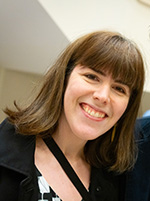 Aimee
Allard
Aimee
Allard
Communications Coordinator & Faculty, CSC Senior Design Center
Allard’s path to computer science could be considered unconventional. After having spent most of her career teaching rhetoric, composition, and technical writing courses as well as upper-level literature courses, it was her interest in and enthusiasm for the Senior Design Center (SDC) that brought her to the CSC Department.
What is your educational background?
I have a bachelor’s in Biology and English, and a master’s in English (with an emphasis on composition pedagogy), both from Florida Gulf Coast University. Then I earned my PhD in 19th and 20th century American literature from the University of Nebraska-Lincoln, where my dissertation focused on the narratives of “madwomen” writers.
Why did you choose a career in computer science?
My background for a career in computer science is what you might call unconventional! Prior to joining the Department, I had ten years of experience teaching first- and second-year rhetoric, composition, and technical writing courses as well as upper-level literature courses. I was lucky to gain some administrative experience, too, having served as the Associate Coordinator of Composition and Assistant Faculty Coordinator of the William H. Thompson Scholars, a residential honors community comprised of first-generation students. After completing my PhD, I moved into academic publishing, working on a range of scholarly journals from the sciences to the humanities.
Then, an opportunity to work with students in the Senior Design Center presented itself and I jumped at the chance! I am really enjoying my work as the Communications Coordinator, which is a faculty position split between co-teaching the Senior Design capstone course with a technical advisor and working with the SDC Director, Ms. Margaret Heil, on the administrative side of things. In Senior Design, I have the privilege of working with students on their writing and communications milestones: from team formation and task planning, to documentation, reports, presentations, and everything in between.
What are some of your research interests?
Coming from a writing- and research-intensive discipline where even as a PhD student I was the instructor of record and taught a 2–2 course load (with a course release for semesters where I was working on a research project or serving in an administrative capacity), I was very much influenced by the different pedagogical approaches to the teaching of writing and literature. I have had the pleasure of working with students from so many different majors, from physics to anthropology, English to mathematics, computer science to the fine arts, but no matter the field, being able to write and support your argument with textual evidence is a valuable skill to have.
Words are a personal, purposeful, and powerful medium, and I took that to heart when pursuing my doctoral studies. I think there is definite cross-collaborative potential to incorporate the literary side of narrative theory alongside visual and computational narrative, and to craft classroom activities and assignments that open new research doors for students and faculty alike. Similarly, I hope to bring a lot of my pedagogical training to the Department, and I look forward to sharing my experience in these areas with faculty in Computer Science.
What do you hope to teach your students? Whether it be a philosophy, topic, etc., what do you want students to leave your classroom and have learned?
Teaching students to communicate well via their writing and presentations is the foundation for success in the Senior Design Center and beyond. I want students to think about what they write and present from critical, technical, and multidisciplinary perspectives. When writing a guide for a nontechnical user or a seasoned developer, students are considering audience. When designing slides to use during a progress report, they are learning to take complex ideas and distill them into a refined form. When documenting code and compiling their interim and final reports, they are composing collaboratively as a team. All of this is writing and communicating, and it is wonderful to see students take ownership of that process as the semester progresses.
I am passionate about our Department’s capstone course because not only do computer science seniors gain real-world experience developing proofs-of-concept and prototypes for sponsors in the tech, education, and non-profit sectors, but the course itself is an innovative model of interdisciplinary pedagogy, with technical advisors from different areas of CSC and instructors from writing/communications backgrounds working together to teach soon-to-be NC State graduates.
What are some things that you enjoy doing in your free time?
In my free time, I enjoy being active outdoors, from long walks or bike rides to landscaping with native plants and pollinator-friendly flowers. Growing fruits, veggies, and herbs in raised beds has been a particularly rewarding endeavor in the four years I’ve called Raleigh home.
Indoors, I enjoy culinary pursuits, everything from cooking to baking, pickling to fermenting. (I actually just finished fermenting a batch of mango-habanero hot sauce using habaneros from our summer garden.) I also love crafts of all kinds, though knitting and crocheting are particular favorites. Outside of EB2, the other academic building you might find me in on campus is the Crafts Center, where I love to throw pottery on the wheel in my spare time.
What is your favorite thing about NC State?
There are so many great things about NC State—the sense of community not only on Centennial but across all of campus, the beauty in nature that can be found here, and the wonderful colleagues I’ve met that have welcomed me into the Department. But my favorite thing has to be the students. Our students are bright, inquisitive, and excited to pursue the challenging problems that computer science courses pose to them. Working with seniors on the cusp of graduation has been such a gratifying experience since there is so much growth from the first week of the semester to the culmination of Senior Design, Posters and Pies, where students showcase their teamwork via professionally-designed posters and creative demos!
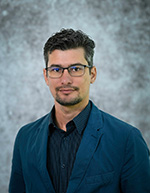 Wesley Assunção
Wesley Assunção
Associate Professor
With multiple degrees in computer science focusing on software engineering, Wesley Assunção is working on model-driven engineering, where everything is seen as a model. His research tries to abstract the level in which software is seen, instead of just writing code.
What is your educational background?
My education was in Brazil. I have a bachelor's degree. Then I got a master’s degree, and then, I got my Ph.D. in computer science, with a focus on software engineering in 2017 from the Federal University of Paraná.
Why did you choose a career in computer science?
It’s the same story as always. I liked to use the computer and back then, when I was about to choose what to do, people were saying computers would be a good thing and doing programming in software engineering would be a big deal. And then I chose it because of that, so I think I made the right choice.
What are some of your research interests?
Nowadays, I'm doing many different things. For my master’s, I wanted something to do with software testing, so making sure that systems were behaving as they were supposed to behave. Then as part of my PhD, I started working with software reuse, and customization, like how to create software and doing mass production of software, but also paying attention to the specific needs of different customers. Then as part of my postdoc, I started working on software quality and in the sense of how to improve the quality of the software and the quality of the code, so that it's easier to maintain and evolve. Lately, I have been working in a lot of model-driven engineering that is in development, and it is where we see everything as a model. We try to abstract the level in which we see the software instead of just writing lines of code. We cannot create models and do a lot of model transformation until we get to the product.
What do you hope to teach your students? Whether it be a philosophy, topic, etc., what do you want students to leave your classroom and have learned?
I mean it depends on the type of student. For the undergrad students, I think if I can help, or at least teach them how to be good professionals and help them in trying to solve practical problems with an elegant solution. I'll be happy with that. For graduate students, it's about preparing researchers and thinkers, not just researchers but people who use a lot of their cognitive power to not only create solutions but also guide the way that technology will develop for use in the future.
What are some things that you enjoy doing in your free time?
One of my hobbies is playing chess, which I’m not doing as much as I would like to do. In my undergrad, I got a scholarship to do my bachelor's, because I played chess. Nowadays, it’s just online chess because it's easier to just open and have on the tablet. But sometimes, when I get together with my friends, I play chess with them. Other than that, I also like to play volleyball, and I also like to travel. I have been to 23 countries, and am trying to reach the 25 countries. I lived in Austria, and it's quite a good place. But as a Brazilian, Brazil has beaches, rainforests, and mountains. So, I would say Brazil is the most beautiful of all of them, but they all have a different flavor.
What is your favorite thing about NC State?
I like a lot of the research, and when I arrived here they made it very clear that they hired me and they want me to be successful and said they would do everything that they can do to help me to be successful. I feel quite welcome and supported which caught my attention when I arrived.
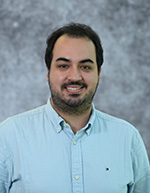 Caio
Batista de Melo
Caio
Batista de Melo
Assistant Teaching Professor
Caio Batista de Melo obtained his Master’s Degree from the University of Brasilia and his PhD from the University of California, Irvine. He hopes to get his students excited about computing, and to prepare them for the real-world workload.
What is your educational background?
I'm originally from Brazil, so I did my Bachelor's and Master's in the University of Brasilia, and then I went to the University of California, Irvine for my PhD.
Why did you choose a career in computer science?
Because of the way our education is in Brazil, it's kind of hard to change majors. So, once you go into college, you kind of have to choose one and it's a little bit trickier to change. But in high school I was very good at math and physics, so I was going for some things and that were mostly those two.
What are some of your research interests?
My research is focused on reliable systems. So how can we detect unexpected situations? I started research in my junior year of undergrad. I was doing software engineering research. So, we're trying to look at software models, scenario modeling software, and trying to detect by scenarios, so it's like it's an error that we don't have specified, that might still happen just because of the randomness of distributed systems. And then moving towards my PhD was kind of the same idea, but closer to systems.
What do you hope to teach your students? Whether it be a philosophy, topic, etc., what do you want students to leave your classroom and have learned?
I usually hope that they kindly joined the class. I have two different approaches, depending on the class, for an intro class, we want to have the resources, everything they need to really get into CSC. Get more people from all different backgrounds. I like to prepare my class for the real-world workload, so my projects are usually a little bit under specified. So, they're going to have to look up things, whenever they're working, because they don't really know everything. I also want to make it welcoming but also get people excited about computers, once they're preparing for life after school.
What are some things that you enjoy doing in your free time?
I watch a lot of movies and TV shows. Before COVID, my wife and I used to go to the movies at least once a week, or watch whatever is on. When COVID hit, we started to do this at home. We have recently restarted going to the movies. I also really liked sports. I watch pretty much any fast-paced sport on TV, but soccer I've watched since I was a kid. I also play games like board games.
What is your favorite thing about NC State?
I like the focus on students. I visited a bunch of campuses during the job market search and whatnot, and I feel like State had a pretty heavy focus on providing sources of support. I mean, I'm an assistant teaching professor, so maybe I was a little biased on what they showed me, but there's just a lot of opportunities to allow me to collaborate on the teaching aspect of students. Some other schools, they focus a lot more on research and I think it's good to have the balance, and I think at State, we do have a lot of focus on teaching as well, which is nice.
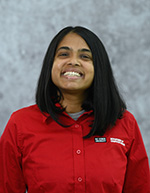 Abida Haque
Abida Haque
Assistant Teaching Professor
After receiving her PhD from NC State this year, Abida Haque has joined the CSC department as an Assistant Teaching Professor. She calls herself a problem-solver, and she really enjoys the kind of math that goes into computer science.
What is your educational background?
I have a BS in mathematics from Mathematical Sciences from Carnegie Mellon University and a master's in computer science from Georgia Tech. Then my Ph.D. is in computer science, and it's from NC State.
Why did you choose a career in computer science?
Basically, I really like problem-solving. And I really like the kind of math that goes into computer science.
What are some of your research interests?
My research has been in cryptography, and like algorithms, you could also add theoretical computer science.
What do you hope to teach your students? Whether it be a philosophy, topic, etc., what do you want students to leave your classroom and have learned?
I want them to learn some problem-solving and study strategies so they can approach any problem in computer science or outside of it with a high level of confidence.
What are some things that you enjoy doing in your free time?
I am really into alternative transportation. So, you can find me, walking, and biking around, or on the bus around campus almost all the time. I don't know what the name of the trail is, but it goes behind the baseball field and goes up past Pullen, and I like to bike there.
What is your favorite thing about NC State?
I like wolf ears.
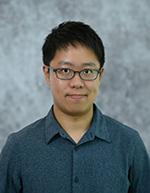 Chin Ho
Lee
Chin Ho
Lee
Associate Professor
Chin Ho Lee is interested in theoretical computer science, an area that studies different aspects of computing from a mathematical point of view.
What is your educational background?
I did my Bachelor’s in Math and an M.Phil in Computer Science at the Chinese University of Hong Kong. Then in 2013, I came to the US to do a PhD at Northeastern University in Boston. I graduated in 2019, then did a two-year postdoc at Columbia University and another two-year postdoc at Harvard University.
Why did you choose a career in computer science?
I was into competitive programming when I was in high school. In the programming team, I was introduced to algorithms and computational complexity, and I found the topics fascinating.
What are your research interests?
I am interested in theoretical computer science, an area that studies different aspects of computing from a mathematical point of view. In particular, I like to understand how randomness plays a role in different areas of computer science such as randomized algorithms, communication, learning, and cryptography. One basic question in the area is to understand in what applications the use of randomness is necessary.
What do you hope to teach your students?
I want to help them explore their own interests, and teach them how to learn on their own.
What do you like to do for fun?
Spending time with family. I also like to cook, play badminton and ski, but I will have to replace the last one with a new hobby.
Favorite thing about NC State?
I am still exploring, but so far, I like how welcoming everyone is here.
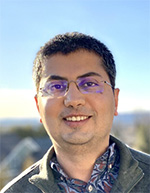 Sharath
Raghvendra
Sharath
Raghvendra
Associate Professor (joining in January 2024)
Joining us in January 2024, Sharath Raghvendra, who calls himself an algorithm designer, earned his PhD from Duke University and brings nine years of prior experience teaching at Virginia Tech.
What is your educational background?
I completed my undergraduate studies in Computer Science from IIIT Hyderabad in 2006 and a Ph.D from Duke University in 2012. After that, I spent two years as a post-doc at Stanford University. For the last nine years, I have been a faculty at Virginia Tech.
What are your research interests?
I'm primarily an algorithm designer. I like to design provable and fast algorithms for solving optimization problems. My students design provable algorithms for a wide range of problems from classical ones (that have been studied for centuries) to those that are driven by modern application areas such as machine learning and logistics. Our algorithms get published in top theory conferences such as STOC, FOCS, SODA and ML conferences such as NeurIPS and ICLR.
What do you hope to teach your students?
I would love to introduce the amazing world of algorithm design to undergraduate and graduate students. I am excited to teach general algorithmic techniques that can dramatically speed-up your code. In my nine years as a professor at Virginia Tech, through my classes, I have recruited dozens of graduate and undergraduate students who have gone on to publish state-of-the-art algorithms for several optimization problems.
What do you like to do for fun?
These days, I spend most of my free time playing with my four-year-old son and two-year-old daughter. I also like to watch movies and listen to good music of all types.
Favorite thing about NC State?
I will be joining in January 2024 and I am hoping to discover several nice things once I join. I'll probably have a very good answer to this question in a year.
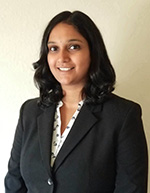 Chandrika
Satyavolu
Chandrika
Satyavolu
Associate Teaching Professor
Chandrika Satyavolu started out in computer networks, like wireless and mobile networks, but is now heavily involved in computer education.
brings years of experience to our program with previous teaching jobs at Oklahoma City, Cal State, and Notre Dame, and we are very much looking forward to seeing all of the amazing things that she will do for our students.
What is your educational background?
I got my bachelor's in India, from a university called DA-IICT, and a bachelor's in information and communication technology there. And then I came here for an MS in computer science, and I got that from San Jose State University in California. And after that, I had a six month break in between and then I started my PhD at the University of Oklahoma.
Why did you choose a career in computer science?
In computer science, honestly, because I was actually told that computer science is, you know, the next big thing. Back then I personally wanted to go into math, and more applied math. And I because I was told by a lot of people who were in the field, I just thought, I will try it out and see how it goes. My first computer science class that I took, I fell in love with it. My first programming class that I took, I really fell in love with it, and I never really went back.
What are your research interests?
I kind of went a full circle, I have to say. I started my doctoral research in computer networks, more specifically wireless and mobile networks, and most of my publications are in that area. But while I was doing my doctoral research, that is when I was kind of exposed to research in computer science education. I found my first mentor while I was, doing my doctoral research, she was in computer science education and that was the first time I was exposed computer science education. But then I continued my doctoral research in networks, because that was where I was already pretty deeply involved. Then I worked for a couple of years at Oklahoma City University where there was no research. After that I went on to Cal State University, which mostly had its emphasis on education. So, it was a tenured track position. But definitely, you know, in a lot tenured track positions there's a lot of emphasis on other areas other than research, and, teaching and I kind of felt my time was kind of being divided into areas I did not feel like I wanted to go into. That's when I kind of explored and I found out there are these teaching professor positions. And then I actually went to Notre Dame and worked there for a year. And I'm here now, because I know there is a lot of education research going on here. I briefly published a little bit in networking education that kind of felt I could step into the education and I was still in networks when I started exploring into education. I started out in networks in now I’m in computer science education.
What do you hope to teach your students?
I keep telling my students to make mistakes. That's how you learn. Make mistakes. Sometimes when you're not sure which path to choose, you could choose either, and even if it is not the right one for you, that's something you're learning. And that'll kind of tell you for sure which way you want to go. And I've had several of those in my career so far. So, I definitely would say, I've learned a lot about myself, and what I really want to do by stepping into a lot of puddles, on the way.
What do you like to do for fun?
During my PhD days, and before I had kids, I used to love playing board games a lot. Strategy board games more specifically, like Dominion and Catan. Everywhere I worked, I was involved with the board game clubs that they had, just because that used to give me that one hour in the week where I used to go in and play with other people who are willing to play as well. Playing board games is definitely you know, at the top of my list. Other than that, I do like escape rooms. I've done quite a few of those, and fortunately, my husband is also very interested in escape rooms, and we do this together, and now we're kind of getting our kids involved. And it's become like a family thing now.
Favorite thing about NC State?
I would say honestly, the students. I have been pleasantly surprised by the maturity they show at an undergraduate level, and the learning maturity they show and also the respect they give to each other and to you. I've had a really good experience here with the students. Definitely, it's miles better than what I've had experienced in the past.
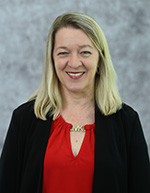 Kimberly
Titus
Kimberly
Titus
Associate Teaching Professor
Kimberly Titus is a 1994 NC State PhD graduate, so we are pleased to welcome her back to the Pack! She has a background in physics, and coming from the physics education community, she found a lot of parallels to the computer science education community looking at how students learn.
What is your educational background?
I'm going to be different from most of the rest in that my undergraduate degrees were in physics and mathematics, a Bachelor of Science in physics and a Bachelor of Arts in mathematics. And then, my PhD was in physics, specifically experimental solid-state physics.
Why did you choose a career in computer science?
A lot of it was opportunity. There's tremendous opportunity in computer science education. And of course, some of the first computer scientists came out of mathematics and physics and other sciences and engineering because they were the ones that were coding before. Early on, my physics heroes were some of the early ones to develop a lot of these systems because they were needing the systems and of course, necessity promotes development of such things. So, it was it was really the opportunity that I was familiar enough with coding for the sake of the physics application. So, I took a step back and said, How do you teach coding best for the sake of really understanding coding from the computer science perspective?
What are some of your research interests?
So, coming from the educational end of things, I was involved in the physics education community, which has somewhat parallel the computer science education community, looking at how do students learn? And how do we take difficult topics and teach them best, depending on the interests of the student, whether they're in engineering, or whether they're in science, or whether they're not in science at all. So definitely along the lines of computer science, education, and data science education, which involves a lot of computer science, but also then brings in sort of other interdisciplinary fields such as stats and math, and as well as applications. And looking at developing tools and tutorials for students, to assist them in learning, coding skills for different applications. That ties into a whole lot of other things as far as even looking at how AI can then be used in the classroom, and how it can be our friend, not our foe. It's sort of along those lines.
What do you hope to teach your students? Whether it be a philosophy, topic, etc., what do you want students to leave your classroom and have learned?
I like the idea of developing curiosity within the students to ask the questions. Why? And not just how but why. But also that they walk away with some confidence in competency in their coding in their coding skills.
What are some things that you enjoy doing in your free time?
I enjoy being active - walking, and hiking, and I love group activities, like Zumba or yoga, or those kinds of things. I was classically trained as a dancer, and also trained as a mime, which ballet uses a lot of pantomime. I had the chance to be trained by two of the students of Marcel Marceau, which was pretty fantastic.
What is your favorite thing about NC State?
It's hard for me to pinpoint because I was student here myself. I spent five years here working for my PhD, and then another four years as a postdoc in the College of Textiles and Textile Engineering. So, to me, it feels like home in terms of the academic atmosphere and the vibe, and just the I guess some of the academic pursuits. It inspires me to be curious and to pursue continuing lifelong learning.
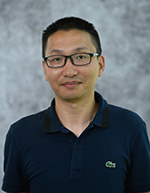 Wujie Wen
Wujie Wen
Associate Professor
Wujie Wen brings many years of experience to our program, as well as a strong interest in computing and design automation. His ultimate goal is to publish a paper, even one or two, that can become real technology that can impact the industry and everyday life.
What is your educational background?
I got my PhD from the University of Pittsburgh, back in 2015. So before that, actually, I attended a university in China and got a master’s degree. My major is mostly in Computer Engineering and science.
Why did you choose a career in computer science?
I think computer science is fast evolving area, you can embrace the latest tech knowledge. You have to learn new things, and embrace yourself and embrace the new technologies. And that's the thing actually that I like. On the other hand, I like to work with students, especially students from computer science and engineering backgrounds, they are so smart and creative.
What are your research interests?
My research interest is mostly on the computing side. So, in other words, our research group has several researchers in different areas but the core area is still on the computing designs, like me. Also design automation for many domain-specific computing systems, such as machine learning and brain-inspired computing. And also, we are developing security and privacy-preserving techniques, like with AI right now, as well as applying them to many different real applications, such as autonomous driving cars and medical things.
What do you hope to teach your students?
I hope they learn the ability to learn new things. So it's not just the knowledge itself I'm teaching. I do want to have the students learn how to learn new things from scratch. I want to them to start a project, let's say, from the idea formulation, then to do some little research and marketing research and eventually put it into implementation and make it work So yeah, I want them to learn how to learn and that's, I think, the most important thing, especially considering the evolving area in computer science.
What do you like to do for fun?
I’m a ping pong fan, so I play ping pong a lot. I like hiking. So, I love mountains and previously actually, I stayed in Pennsylvania. I also like traveling and I have visited a lot of different places. For example, in the last three months, I visited Hawaii.
Favorite thing about NC State?
I think one very great thing is that we have a large number of students who actually are very hands on in the engineering and like a computer science major. We have a lot of very distinguished research groups, so I can easily work with them. I have found many mutual interests. Since I’m here, I'm sure that in the next few years, I will find more, I mean, many, many more interests in research projects. My final goal is not just to publish a paper because you can publish 100 papers. But I really want to publish a paper, even one or two can become the real technology and that can impact the industry and human life.
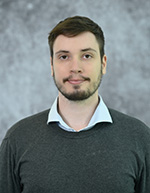 Dominik
Wermke
Dominik
Wermke
Assistant Professor
Dominik Wermke was born and raised in Germany and recently obtained his PhD from the University of Hanover, with prior Masters and Bachelors in Science. His general research goal is to help developers or, in general, software experts, write more secure, more privacy-friendly, and more trustworthy software.
What is your educational background?
I have a PhD in computer science, or the German equivalent of a PhD, and I got that from the University of Hannover in 2023. Before that, I got both a master’s and a Bachelor’s of Science, also in Germany.
Why did you choose a career in computer science?
One of the things I like most about computer science is that you can be like a craftsman. You can not only be a craftsman and build stuff, but also you can build the tools you use yourself, and I feel that's a very rare thing. In computer science, if you can imagine that you can, you can probably build it; you only need a computer. You can also build the tools that help you with that. That also is where my research comes in because I closely work with developers to help them build more secure tools.
What are some of your research interests?
My general research goal is to help developers or, in general, software experts, write more secure, more privacy-friendly, and more trustworthy software, the goal is that if, during the development of software, it's more secure, then potentially thousands of users also benefit from having more secure software. In terms of research, it mostly involves both qualitative and quantitative approaches, so I measure stuff, generally, but I also talk to the developers to figure out why they did stuff a certain way and display context to the numbers I recorded before.
What do you hope to teach your students? Whether it be a philosophy, topic, etc., what do you want students to leave your classroom and have learned?
I would say, in general, it's the concept of being security aware. Of course, right now, I can teach students a lot about current security practices and so on, but if they go into the industry, they will probably, in 10 years, or at some point, require security knowledge, but attacks probably will have gotten quite advanced by the time so at that point, what I've taught them, probably doesn't apply anymore, but I want them to at least have the feeling of “oh should probably do something about it.”
What are some things that you enjoy doing in your free time?
I like to hike and go rock climbing.
What is your favorite thing about NC State?
I definitely like how big the campus is. And if you step out between classes, it's full of bustle. It's bustling with students everywhere and people going somewhere and talking about awesome stuff in computer science. I think that's really great.
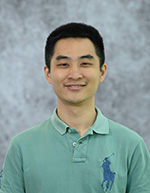 Bowen Xu
Bowen Xu
Assistant Professor
Bowen Xu is very passionate about the study of computer science., particularly AI and software engineering. He is working at the intersection of machine learning, AI, and software engineering.
What is your educational background?
I got my bachelor’s degree and master’s degree in China. And then, after that, I pursued a PhD in Singapore. So, I spent five or six years there, then became a postdoc there. And now I'm here at NC State.
Why did you choose a career in computer science?
Going back to my educational background, during my bachelor’s, my master’s, and even my Ph.D., my major was always software engineering, which is a branch of the computer science field. I just feel like I'm very passionate about the study of computer science. After I graduated from my master’s program, it was super easy to find a job with a good salary in the industry, which is why I initially didn’t plan to seek a Ph.D. But then I published a few good papers during my master’s and found, “Oh, that's my interest.”
What are some of your research interests?
My broad research area is software engineering, but I mainly focus on artificial intelligence and software engineering. So, I'm working at the intersection of machine learning, artificial intelligence, and software engineering. And I'm super excited about the future of programming or programming education. And I found that in programming, a lot of things can be fully automated. That's why it motivates me to seek efficient or effective machine learning techniques to automate those tasks. My research is basically about leveraging knowledge from big software engineering data.
What do you hope to teach your students? Whether it be a philosophy, topic, etc., what do you want students to leave your classroom and have learned?
The key is that because the techniques are evolving very fast, I want them to learn problem-solving skills, especially in the context of software development. Many of my students are pursuing industry positions in the future, so I hope they can have better abilities for problem-solving or many software engineering tasks. And they have a sufficient knowledge base to share their projects.
What are some things that you enjoy doing in your free time?
I have been a big basketball fan since I was five or six years old, so I have watched the NBA since then. My favorite basketball player in the NBA is Tracy McGrady. Unfortunately, I found that when I grew older and older, my physical condition did not really allow me to play basketball anymore, but I still watch a lot of NBA games during my spare time. Another hobby of mine is rock climbing. In basketball games, I've learned how to do teamwork better; in rock climbing, I learned more about achieving a goal. So, these two different types of sports have taught me different things. I really get inspired by sports in my research and also in educating my students. So, I think it's very interesting to combine my interest in sports and research.
What is your favorite thing about NC State?
It will have to be the software engineering research because we have a super strong software engineering team here. That's the most important thing for me to, you know, in pursuing my research career. I can work with my colleagues as a team to make software engineering research at NC State more well-known. That's one of the main reasons I came here, because of their research.
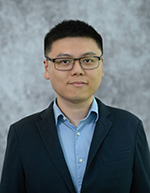 Chenhan Xu
Chenhan Xu
Assistant Professor
Chenhan Xu carries a deep interest in helping people through computer science. His goal in teaching a course is to let students use the knowledge that they learned from the course in their lives.
What is your educational background?
I finished my bachelor’s degree in China, and then I got my Ph.D. from the University of Buffalo in Computer Science and Engineering Ph.D.
Why did you choose a career in computer science?
Back to my Bachelor's when I was an undergraduate, I did network engineering. So that's a kind of information technology but not pure computer science. At that time, I actually developed an interest in Internet operating systems. I built some systems, and then I found my interest. I joined a lab where my advisor helped me publish several papers. I want to use my research to help people in real life. So that's why I choose Computer Science and Engineering.
What are some of your research interests?
It's mainly the human-centric internet of things. I developed many sensing and computing systems that can help people live better, for example, to sensor bio signals to help with health monitoring, and some of those applications like biometrics, and also some human-computer interfaces.
What do you hope to teach your students? Whether it be a philosophy, topic, etc., what do you want students to leave your classroom and have learned?
This semester, I'm teaching a biometric system. So, my goal in teaching a course is actually to let students use the knowledge that they learned from my course, in their lives. For example, this semester, I developed a biometric system. So, I encode many topics, like the ethics topics in biometric systems, whether there is any bias in biometric systems where my students use those biometric systems like face ID or Touch ID on their phone, and what could be the potential risks.
What are some things that you enjoy doing in your free time?
I actually do star-gazing so at midnight I have gone out to a place called Terry Spring State Park in Pennsylvania. I went there several times for stargazing, and that's beautiful. I'd stay there and just, you know, see stars and the Milky Way.
What is your favorite thing about NC State?
The students here, I think are really smart, and they're really self-motivated. My students are always asking me questions, and they are not like, simple questions, they take me some time to answer them. They are really smart and they are eager to gain the knowledge.
~crews~
Return To News Homepage